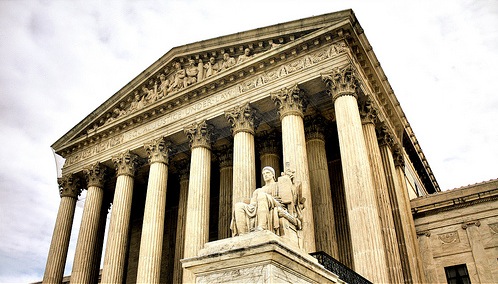Dozens of major U.S. companies have come out in support of marriage equality, including Apple, Facebook, eBay, and Intel. In legal briefings submitted to help overturn California’s ballot initiative, Proposition 8, which made same-sex marriage unconstitutional, the companies argue that “recognizing the rights of same-sex couples to marry is more than a constitutional issue. It is a business imperative.”
The document submitted in support of the legal teams, known as an amicus brief, explains:
“By singling out a group for less favorable treatment, Proposition 8 impedes businesses from achieving the market’s ideal of efficient operations — particularly in recruiting, hiring, and retaining talented people who are in the best position to operate at their highest capacity. Amici are competing domestically and internationally with companies inside and outside the United States in places where all couples, regardless of whether they are of the same sex, are afforded equal access to marriage.”
The brief, which gives argumentative support to the legal teams, Theodore Olson of Gibson Dunn & Crutcher and David Boies of Boies, Schiller & Flexner, for the prop 8 case, Hollingsworth v. Perry, further explains that potential recruits “may forgo the opportunity to work in California, and prefer other states (like Iowa, New York, and Massachusetts) or other nations (like Spain, Sweden, Denmark, the Netherlands, Portugal, or Belgium) where they can be married and obtain equal treatment and respect under the law.”
Not to be entirely callous about the need for same-sex marriage, the companies argue that marriage equality is a moral issue, as well, writing that laws like prop 8 “send an unmistakeable signal that same-sex couples are in some way inferior to opposite-sex couples, a proposition that is anathema to amici’s commitment to equality and fair treatment to all.”
The amicus brief is careful not to demonize proposition 8 supporters, carefully noting that such laws are not the “product of ill will”
Finally, just in case opponents of same-sex marriage are really just worried about the economy, the amicus brief maintains that “increased wedding celebrations can mean additional revenue for many businesses — such as businesses involved directly in wedding celebrations, businesses that produce goods often given as gifts to newlyweds, and businesses that benefit from increased tourism from guests who travel to the wedding.”
This is not the first time that tech giants have come out in support of marriage equality. Google, for instance, setup an online campaign, with a heartwarming video (below), to support same-sex marriage laws in the 2012 election. “The Four” achieved complete victory, stopping bans or expanding rights in Washington, Maryland, Maine, and Minnesota.
Hollingsworth v. Perry is currently being considered by the Supreme Court.
[Image Credit: Flickr User Phil Roeder]
